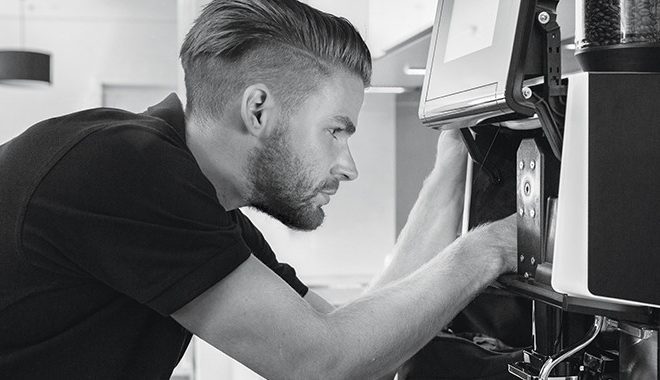Professional Coffee Machine Maintenance Ensuring Optimal Performance and Longevity

In the world of coffee, a high-quality professional coffee machine is an essential tool for delivering the perfect cup of coffee. Whether it’s an espresso machine, a pour-over machine, or a coffee vending machine, regular maintenance is crucial to ensure optimal performance, consistent taste, and the longevity of the equipment. In this article, we will explore the importance of professional coffee machine maintenance, discuss key maintenance tasks, and provide useful tips for keeping your coffee machine in top condition.
Importance of Professional Coffee Machine Maintenance
Consistent Performance: Regular maintenance helps to ensure that your coffee machine consistently delivers the desired performance. Proper maintenance minimizes the risk of breakdowns, malfunctions, or subpar coffee quality, which can impact customer satisfaction and your business’s reputation.
Prolonged Lifespan: Coffee machines are significant investments, and regular maintenance can extend their lifespan. By preventing the buildup of mineral deposits, rust, or other damages, you can avoid costly repairs or premature replacement of the equipment.
Quality of Coffee: Coffee flavor and aroma depend not only on the beans but also on the quality of the equipment. A well-maintained coffee machine guarantees consistent water temperature, proper pressure, and clean brewing components, resulting in a delicious and flavorful cup of coffee every time.
Key Maintenance Tasks
Daily Cleaning: Cleaning your coffee machine thoroughly on a daily basis is essential. This includes wiping down the exterior, removing any coffee residue or spills, and emptying the drip tray. Pay special attention to the brewing group, portafilter, and steam wand, as these areas often accumulate coffee oils, milk residue, and limescale.
Backflushing and Descaling: Backflushing is a process specific to espresso machines. It involves running water through the brew group without coffee to remove coffee oils and residue that can affect the taste of the espresso. Descaling, on the other hand, is necessary to remove limescale deposits that can clog the machine’s internal components. Use descaling products recommended by the manufacturer, following their instructions carefully.
Water Filtration: Water quality is crucial for the taste and performance of your coffee machine. Using a water filtration system, such as activated carbon or reverse osmosis, can help remove impurities and minerals that can cause scale buildup. Regularly replace the filter cartridges as recommended by the manufacturer.
Lubrication and Seal Inspection: Some coffee machines require lubrication of moving parts to ensure smooth operation. Check the manufacturer’s guidelines to identify the specific areas that require lubrication and use food-grade lubricants. Additionally, inspect the seals and gaskets regularly, replacing any that are damaged or worn out to prevent leaks and ensure proper pressure.
Calibration and Adjustment: Professional coffee machines often have various adjustable parameters, such as water temperature, pressure, and grind size. Periodically calibrate and adjust these settings according to the type of coffee and the desired flavor profile. Consult the machine’s user manual or contact the manufacturer for guidance on optimal settings.
Useful Tips for Coffee Machine Maintenance
Follow Manufacturer’s Guidelines: Every coffee machine is unique, and manufacturers provide specific maintenance guidelines. Always refer to the user manual and follow their recommendations for cleaning, descaling, and general maintenance.
Train Staff: Proper maintenance of coffee machines requires knowledge and skill. Train your staff on how to clean and maintain the equipment correctly. Educate them about the importance of regular maintenance and provide them with the necessary tools and cleaning supplies.
Keep a Maintenance Schedule: Create a maintenance schedule to ensure tasks are performed regularly and systematically. This includes daily, weekly, monthly, and periodic maintenance tasks. Assign responsibility for each task and keep a record of maintenance performed for future reference.
Use High-Quality Cleaning Products: Invest in high-quality cleaning products specifically designed for coffee machines. Using the right products ensures effective cleaning without causing damage to the machine’s components.
Regularly Inspect and Replace Parts: Regularly inspect various components, such as filters, shower screens, group gaskets, and steam wand nozzles. Replace any worn-out or damaged parts promptly to maintain optimal performance.
Conclusion
Professional coffee machine maintenance is crucial for ensuring consistent performance, prolonging the lifespan of the equipment, and delivering high-quality coffee. By implementing a regular maintenance routine, following manufacturer guidelines, and training staff adequately, you can enjoy the benefits of a well-maintained coffee machine for years to come. Remember, a well-cared-for coffee machine not only enhances the coffee-drinking experience but also contributes to the success of your business.
Leave a reply
You must be logged in to post a comment.
















